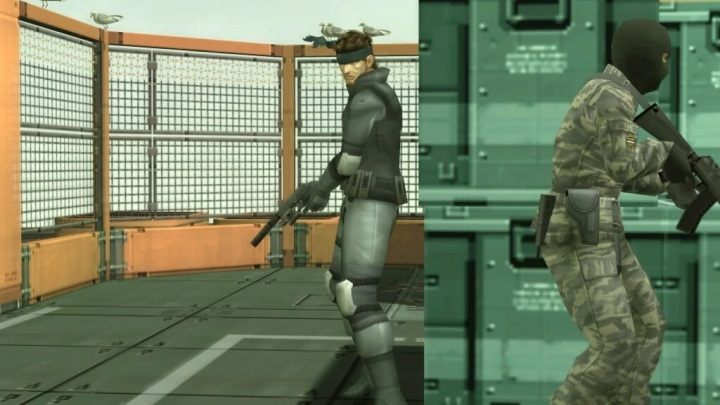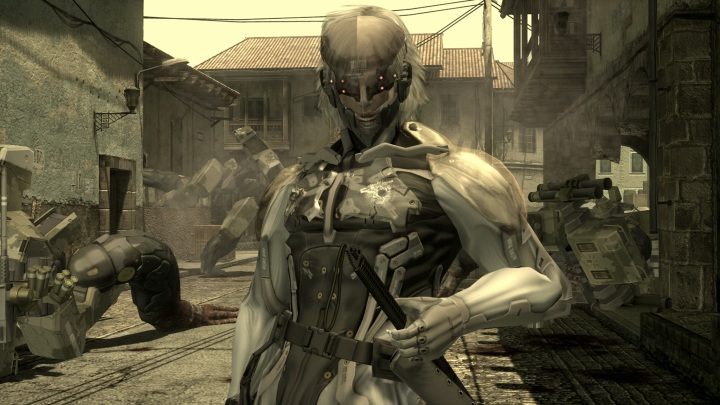Somebody stop me, or I'll end this series!!!. How Hideo Kojima Brought Hollywood to Video Games?

- How Hideo Kojima Brought Hollywood to Video Games?
- The pink eighties
- Somebody stop me, or I'll end this series!!!
- Trouble in Paradise
- New beginnings
Somebody stop me, or I'll end this series!!!
The phenomenal reception that Metal Gear Solid was met with gave Kojima the right attitude and freedom, which both allowed him to truly unfold. For example, he started playing sassy games with his fans. Metal Gear Solid 2: Sons of Liberty, looked like a sequel created according to the "more of the same thing, but better" principle.
You can imagine the surprise of a fan of the series, who launches the game for the first time just to learn that Kojima, unbeknownst to anyone outside the team, changed the protagonist – Solid Snake was only controlled by the player during the prologue, and later gave way to a total rookie, Raiden. The hoax was actually an extensive operation – they event went as far as preparing gameplays with Solid Snake in place of Raiden. The substitution surprised everyone, and angered many. And Hideo? Hideo was having fun.

With Metal Gear Solid 2, Hideo Kojima also revealed that it was the last installment in the series he would develop, and that he would proceed to develop other IPs in the future. The players took these words seriously and it was a sad day for gaming. Before long, however, Kojima announced that since he couldn't find anyone willing to take MGS 3 over, he would do it himself. But this time, it would really be the last game in the series.
Kojima tried to play with fans again, but the great mystery about the identity of the protagonist was quickly leaked. Instead of Solid Snake, players would enact Big Boss, the antagonist of Metal Gear and Metal Gear 2. This didn't prevent the game from achieving success – Metal Gear Solid 3: Snake Eater is today recognized by many as the best installment of the series.
THE VOICE OF SNAKE
If we were to arrange a competition for the most distinctive voice in video games, Solid Snake would be a safe bet. The hoarse tone that fans loved was produced by the vocal cords of David Hayter, an actor, screenwriter and director who has grew very fond of the character he played, and the entire Metal Gear Solid series. He was such a big fan of the franchise that he refused half the salary offered to him when remaking Metal Gear Solid (subtitled Twin Snakes), just to make sure the budged would be able to accommodate the entire cast.
However, Hideo Kojima was not a big fan of Hayter's voice. The Japanese would-be director dreamed that his characters would be voiced by the biggest names of the silver screen. Already with Metal Gear Solid 3, David Hayter again had to take part in a casting, because Kojima supposedly wanted to replace him with Kurt Russel. Hayter came out on top, but in case of Metal Gear Solid V, he wasn't even asked to participate, and his place was taken by Kiefer Sutherland, known from the TV series 24 Hours. Kojima could not get enough of Sutherland's professionalism and skill, but most players missed Hayter.
He was, unsurprisingly, nettled by the whole affair. When in an interview for Game Informer, he was asked if he'd already played Metal Gear Solid V, he said: "Well... It'll be 60 hours of humiliation, and I can't wait to see it. No, I haven't played neither of the two last games yet (MGSV consists of two games – Ground Zeroes, a sort of a prologue, and the proper game called The Phantom Pain) because it would hurt too much.”
Metal Gear Solid 4: Guns of the Patriots is another game in the series that should have certainly and definitely been the last one. The reason that allegedly prompted Kojima to work were threats from fans. And this time, you could even lend some credibility to such a statement, as the game was full of references to the previous installments, and really felt like a huge epilogue for the series. But it wasn't – since that game, we got MGS: Peacewalker, Metal Gear Rising: Revengeance, the arduous development of which is another story, and, of course, MGS V.

Meanwhile, Kojima was reaping renown not only in Konami, but also throughout the industry. The players loved not only his games, but also the specific way of their promotion – after the Raiden affair in MGS2, each subsequent trailer for Metal Gears was closely dissected, the conspiracies exposed, and the clues that might reveal the plans of the able Japanese developer carefully analyzed. At Konami, Hideo became the Vice President of the company's video games department. However, not all executives liked Kojima's position and power, and the fact that he was already a celebrity in the industry at that time further exacerbated the sentiments.
OTHER WORKS
The Metal Gear series is Kojima's most opus magnum. In addition to that series, and the already mentioned Snatcher, he also created other games. Here are the most prominent of them:
- Policenauts – released in 1994, a sci-fi detective adventure, depicting the investigation into alien colonies. Despite a good reception, it never went outside Japan.
- Zone of the Enders – a series of three-dimensional games focused on mech battles in the outer space. It consists of two major hits on the PS2, a spin-off for Game Boy Advance and two reissues (the latter designed for the VR). A reasonably popular series – also in the west.
- Boktai: The Sun Is in Your Hand is an action-RPG for Game Boy Advance, whose main gimmick was the light sensors in the cartridges, using which provided some bonuses in the game.
